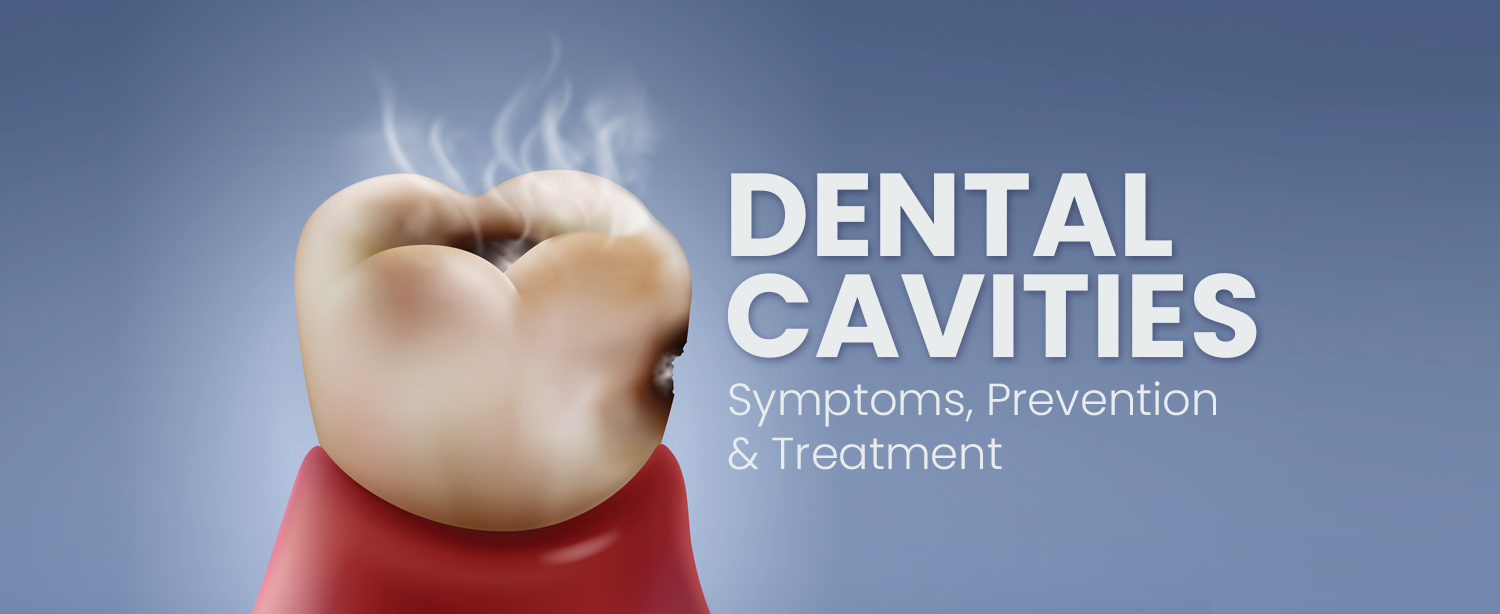Dental cavities are one of the most common oral health problems affecting individuals across all age groups. Statistics suggest that dental cavities are a significant public health concern in India and more than 54% of the population suffers from them. Despite advances in dental care, cavities continue to be a major concern in urban as well as rural populations. Let us understand from dental experts the comprehensive guide on symptoms, prevention, and treatment of dental cavities to help you maintain long-term oral health.
Table of Contents
What Are Dental Cavities?
Dental cavities are the result of bacteria in the mouth dissolving tooth enamel, causing decay. The main offenders are plaque-forming bacteria that feed on sugars and starches in food. When these bacteria mix with residual food particles, they release acid, which slowly erodes the surface of the tooth, forming holes or cavities. Without intervention, cavities may cause discomfort, infections, and even tooth loss. Be regular with your dental health checkups for early care for cavities.
Symptoms of Dental Cavities
Cavities often develop silently, making early detection very crucial for preserving your teeth and your oral health. Some of the common signs include:
- Tooth Sensitivity
Increased sensitivity to hot, cold, sweet, or acidic foods and drinks. - Toothache
Continuous or intermittent pain, especially when chewing or biting. - Visible Holes or Pits
Small holes or dark spots on the tooth surface. - Bad Breath
Persistent bad breath or an unpleasant taste in the mouth due to bacterial buildup. - Discoloration
White, brown, or black staining on the teeth. - Swelling or Abscess
In severe cases, swelling, pus formation, or a foul taste in the mouth may indicate infection.
If you notice any of these signs, consult dentists near you for early intervention and treatment.
Preventing Dental Cavities
Prevention is always better than cure, and making a few lifestyle changes can significantly reduce your chances of cavities. Here are some effective steps:
- Brush Properly and Regularly
Brush using fluoride toothpaste at least twice a day. Focus on the gum line and molars, where food particles tend to get stuck. - Floss Daily
Flossing cleans between teeth, areas that brushing might not reach, and removes plaque and food debris. - Reduce Sugary and Acidic Foods
Reduce sweets, sodas, fruit juices, and processed carbs that are sources of bacteria growth and acid production. - Stay Hydrated:
Drinking water often washes food particles away and keeps saliva production going, which naturally neutralizes acids. - Chew Sugar-Free Gum
Stimulates saliva production and slows plaque buildup. - Use Fluoride Products
Fluoride builds up enamel and prevents cavities. Consider professional fluoride treatments if you are at higher risk. - Regular Dental Checkups
Go to see your dentist every six months for professional cleanings and the early identification of cavities.
By adopting these habits, you can safeguard your teeth and lower your risk of dental decay.
Treatment Options for Dental Cavities
If cavities occur in spite of preventive measures, early dental intervention is required. The treatment depends on the extent of decay:
- Fluoride Treatments
In the initial phases of a cavity, professional fluoride treatments can reverse early decay. - Dental Fillings
When the decay has extended past the enamel, dentists have the decayed portion removed and filled with materials such as composite resin or amalgam. - Dental Crowns
For extensive decay that weakens the tooth structure, a customized crown is placed over the tooth to rebuild and restore it. - Root Canal Therapy
If decay reaches the tooth pulp, a root canal procedure is needed to remove the infected tissue and seal the tooth. - Tooth Extraction
In severe cases in which the decayed tooth cannot be saved, extraction is the only way out. The missing tooth is then replaced with a dental implant or bridge.
Dental Care at Kokilaben Dhirubhai Ambani Hospital
Are you suffering from a dental cavity? Consult some of the best dentists in Mumbai at our Department of Dental Surgery. With convenient hours and also after-hours emergency care on Sundays and holidays we are committed to offering our patients the best possible dental care. Our team follows high safety and sterilization standards and treats dental cavities using the latest technology and equipment. If you’re looking for expert care, consult the best dentists in Mumbai today and take the first step towards a healthier smile! https://www.kokilabenhospital.com/departments/clinicaldepartments/dentalsurgery.html


